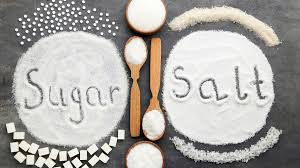India poisoning its people by excessive use of micro-plastics in salt, sugar brands: Study
 New Delhi: Indian is injecting poison in people by using excessive micro-plastic in salt and sugar brands, big or small, packaged or unpackaged, according to a study published on Tuesday.
New Delhi: Indian is injecting poison in people by using excessive micro-plastic in salt and sugar brands, big or small, packaged or unpackaged, according to a study published on Tuesday.
According to Kashmir Media Service, the report stated, “Micro-plastics in Salt and Sugar” and conducted by the environmental research organization Toxics Link, tested 10 types of salt, including table salt, rock salt, sea salt and local raw salt, and five types of sugar purchased from both online and local markets.
The study revealed the presence of micro-plastics in all salt and sugar samples, in various forms, including fibre, pellets, films and fragments. The size of these micro-plastics ranged from 0.1 mm to 5 mm.
The highest levels of micro-plastics were found in iodized salt, in the form of multi-colored thin fibre and films.
Toxics Link founder-director Ravi Agarwal said, “The objective of our study was to contribute to the existing scientific database on micro-plastics so that the global plastic treaty can address this issue in a concrete and focused manner.”
“We also aim to trigger policy action and attract researchers’ attention to potential technological interventions that could reduce exposure risks to micro-plastics”, the report revealed.
Toxics Link associate director Satish Sinha added, “Our study’s finding of substantial amounts of micro-plastics in all salt and sugar samples is concerning and calls for urgent, comprehensive research into the long-term health impacts of micro-plastics on human health.”
The concentration of micro-plastics in the salt samples ranged from 6.71 to 89.15 pieces per kilogram of dry weight, the report said.
Iodized salt had the highest concentration of micro-plastics (89.15 pieces per kilogram) while organic rock salt had the lowest (6.70 pieces per kilogram), according to the study.
In sugar samples, the concentration of micro-plastics ranged from 11.85 to 68.25 pieces per kilogram, with the highest concentration found in non-organic sugar.
Micro-plastics are a growing global concern because they can harm both health and the environment. These tiny plastic particles can enter the human body through food, water and air.
Recent research has found micro-plastics in human organs such as the lungs, heart, and even in breast milk and unborn babies.
Previous studies found that the average Indian consumes 10.98 grams of salt and around 10 spoons of sugar every day, much higher than the World Health Organization’s recommended limits.








